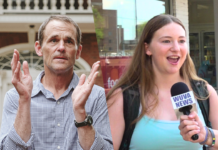On Thursday afternoon, ProPublica journalist T. Christian Miller sat down with Media Studies professor Andrea Press for a discussion about journalistic integrity. Miller recently won a Pulitzer Prize for his long-form investigative story, “An Unbelievable Story of Rape,” which examined how a legitimate rape case ended with the victim pleading guilty to a false accusation charge.
Miller began his discussion by articulating his mantra as a journalist: “Reporters are best served by following the road you find, not the road you want to go down.”
He followed this philosophy all the way to a Pulitzer Prize for his investigation of a 2011 Colorado rape. An 18-year old identified as “Marie” filed a police report that she was raped only to retract her story a few weeks after, claiming she had made it up. Eager to put the ordeal behind her, Marie pleaded guilty to false reporting. Earlier this year, however, Colorado officials secured the conviction of serial rapist Marc Patrick O’Leary and were able to confirm that he had, in fact, raped Marie in 2011. Her record was expunged, and O’Leary was sentenced to 40 years for his Colorado rape and 28.5 years for a Washington rape.
When reporting on such a sensitive subject matter, Miller says he was careful to examine all sides of the story even if the results surprised him. As a reporter for ProPublica, he is not under the same deadlines as reporters for the mainstream news. The non-profit newsroom ProPublica lives off of contributions rather than advertising money, allowing Miller to spend over six months on one investigative piece.
Miller articulated the struggles of being a journalist attempting to cite social science studies. When attempting to use these studies as evidence, he is at the mercy of the academic process, noting that all journals are peer-reviewed. Because of this, it is more difficult for journalists on deadlines to “weed out the BS.”
“As a journalist, your job is to bring skepticism to everything,” Miller explained.
Professor Press acknowledged the imperfections of social science, and the fact that the words “consent” and “assault” mean different things to different people. She called for more research on sexual assault and rape, saying that journalism as a field is “not set up to adjudicate intimate life at that level.”
Media Studies professor Siva Vaidhyanathan wondered whether journalism and social science work at cross purposes, as journalism follows a case, and social science follows a phenomenon. Miller argued that journalists understand the world through a story and look for a narrative arc, but agreed with Press that Sabrina Rubin Erdely’s failure in the case of her Rolling Stone article “A Rape on Campus” displays the problem with this.
On the subject of whether or not sexual assault survivors should be granted anonymity, Miller states that he does not feel comfortable naming survivors unless other news outlets do the same. However, he does raise questions on whether leaving victims anonymous is the right choice.
“Are we perpetuating the social stigma of sexual assault by not naming survivors?,” Miller asked.
When asked about his technique in approaching police departments, Miller articulated his “no surprises” rule that nothing should appear in a story that the target does not know about.
“It’s a transaction,” he said. “Trust me to report accurately, but remember I’m not your friend.”
Andrea Press concluded the discussion by calling on the Greek community to respond more actively to the problem of sexual assault.
















